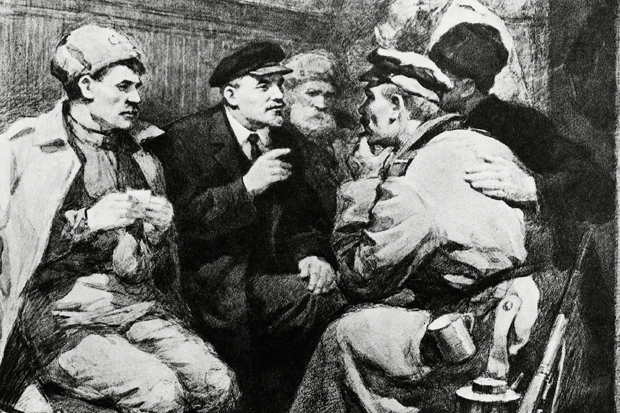Full allowance must be made for the desperate tasks to which the German war leaders were already committed… Nevertheless it was with a sense of awe that they turned upon Russia the most grisly of weapons. They transported Lenin in a sealed truck like a plague bacillus from Switzerland to Russia.
As so often, Churchill has the best lines. Here he is about one of the most famous episodes in European history: the safe passage given to Lenin by a Germany desperate for victory in the first world war. As long as German high command could dream up ways to eliminate the threat from either the West or East, there was hope it would not suffer defeat.
Lenin, as Churchill wrote, was imperial Russia’s ‘Vengeance’. Germany thought Lenin’s arrival in Russia could mean an early end to the war, as he had so often denigrated the imperialist-capitalist war effort. In fact, they were spectacularly wrong, because the Bolsheviks proved to be as militaristic as their autocratic predecessors.
In 1917, Lenin was living in exile in Switzerland, acutely aware that history was in danger of overtaking him. The February revolution had come as something of a surprise; even after decades of plotting the Tsar’s demise, Russia’s revolutionaries were presented with Nicholas II’s swift abdication after a popular revolt.
Worse, political moderates had seized power; moderate, that is, from the Bolshevik point of view, which held that anyone debating or negotiating was weak at best and criminally deluded at worst. Lenin was furious about his remove from the fray. He simply had to get back to Russia, to eradicate the last vestiges of autocracy and the relatively democratic socialism on the rise, led by Alexander Kerensky.
In Lenin on the Train, Catherine Merridale gives us a detailed look at the famous train journey from Zurich to Petrograd. We read that Lenin’s ‘sealed truck’ was actually no more than a series of carriages with locked doors; the Bolshevik and his wife, along with a handful of other exiled socialists, travelled through Germany eagerly looking out of the windows. The carriages were far from being hermetically sealed, even though the lawyerly Lenin had insisted on the train being granted extraterritorial rights, heightening its estrangement in popular imagination.
Merridale, who travelled the same route as Lenin for the purposes of research (albeit with little noticeable effect in her work), gives us a fascinatingly realist look at the journey. German military guards travelled in the end carriage, but the Russian party drew a chalk line beyond which they could not pass. Lenin, who Merridale describes as like a schoolteacher putting his pencils in neat rows, devised a system by which the company’s smokers had second-class ‘toilet tickets’ to indulge their habit: smoking was not allowed in the carriages, and those in actual need of the facilities were given first-class ‘tickets’. Singing was not allowed at set times; ‘heart-on-sleeve’ Russian discussions were settled by giving the loudest debaters heavy newspapers to read instead; and Lenin and his wife Nadezhda Krupskaya had a carriage to themselves after first refusing it on the grounds of everyone being equal.
The stuffy and disputatious atmosphere of the train, first in Germany and later travelling through Sweden and Finland, where the snow bent down the trees lining the train tracks, lies at the heart of the account. And yet we start with a lengthy summary of the historical context and end with the October Revolution. Of course, these stories have been told many times, by historians of every persuasion, and although Merridale is interesting, she is hardly groundbreaking.
That said, she is good at capturing the frankly dodgy atmosphere of high politics and low motives that swirled around post-abdication Russia. Even though we already know about chancers like Alexander Parvus, working for German Intelligence while helping the Bolsheviks, pocketing vast sums of money in the process, it remains intriguing to think about the thousands of spies seeking to understand or profit from events.
Merridale can bring humour into the most gruesome moments. Reflecting on the poisoning, shooting and drowning of Grigori Rasputin, she registers the shock of British diplomats, drily noting that this type of murder would certainly not have happened to a clergyman in Chelsea. Much of what occurred in Russia in 1917 (as indeed before and since) was beyond the experience of people with less bloodthirsty governments.
In the end, Merridale seems in two minds about Lenin. At one point, she calls him a ‘great’ man and the hope of the future, but ends by calling him a monster, rotten to the core. She reserves her straightforward disgust for Stalin (as many others have done), remaining ambivalent about what might have been under a less cruel Lenin.
It is perfectly clear, almost a century on, just as it was to Churchill in the 1920s, that Lenin was bad news. The 20th century could have turned out a lot better if he had simply never been given a train ride, and been left to fulminate in the Swiss Alps.






Comments